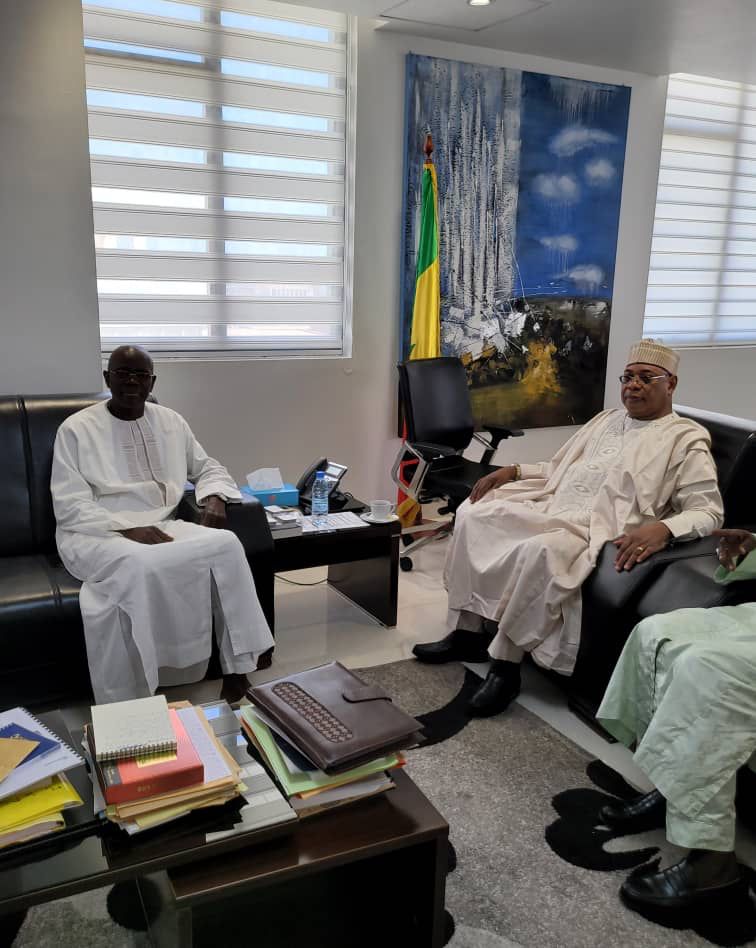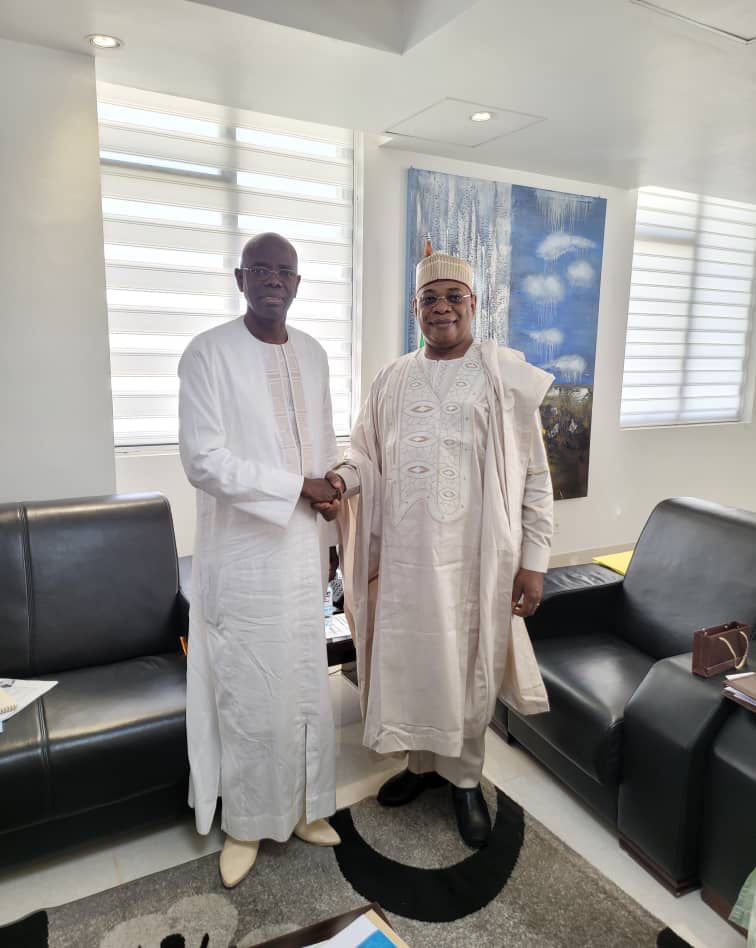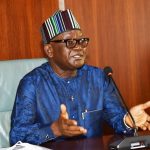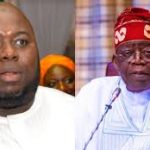Photo: Mr. Papa Sagna Mbaye, Senegal Minister of Fisheries & Maritime Economy (left)presenting a souvenir to Dr Paul Adalikwu, Secretary General, Maritime Organisation of West and Central Africa (MOWCA), after a strategic engagement in Dakar recently.
The Maritime Organisation of West and Central Africa (MOWCA) has secured support of the Senegalese government in it’s efforts to guide member countries to attain their blue economy potential
Dr. Paul Adalikwu, Secretary General of MOWCA, who met with Papa Sagna Mbaye, Senegal Minister of Fisheries & Maritime Economy in Dakar recently, reiterated MOWCA’s commitment to strengthen economic integration among its member states through viable maritime trade.
Adalikwu told Sagna that the identified potentials in country-to-country trade utilizing ports, rail, pipeline and road interconnectivity will boost the economies of MOWCA member states and advance their participation in the African Continental Free Trade Area.
The MOWCA SG who described the Port of Dakar as a viable trade edifice, said Senegal maritime infrastructure is robust to impact on neighbouring states like Mali.
Adalikwu said the blue economy concept which aims at harnessing economic benefits from waters is not leaving landlocked countries behind.

According to him dry ports and terminals in none coastal areas like Mali utilising inter-modal transport such as road, rail and pipeline will move bulk, containerized and liquid cargoes within the sub region and beyond.
Dr. Adalikwu described the 678Km long West African Gas Pipeline (WAGP) Project from Nigeria running through Benin Republic, Togo and Ghana as a good example of intra African trade utilising a smarter mode to move liquid cargo.
The SG commended the level of partnerships among MOWCA member countries and restated that the organization will continually promote such cooperation to boost investments and employment generation through an emerging African-wide cabotage regime.
Minister Papa Sagna Mbaye while thanking the SG for the visit, expressed optimism that MOWCA under Adalikwu was repositioned to succeed.
He described the visit as confidence building for the Senegalese government, while reassuring of more deliberate and increased participation of his country in all MOWCA activities including the drive for a robust blue economy.
“The 678Km long West African Gas Pipeline (WAGP) Project from Nigeria running through Benin Republic, Togo and Ghana as a good example of intra African trade utilising a smarter mode to move liquid cargo.”
Also, MOWCA through its Secretary General has commenced talks with Afreximbank to open ship financing and procurement of other maritime asset opportunities for African investors and maritime stakeholders.
After a virtual bilateral meeting between MOWCA and Afreximbank, both organisations agreed on the need to expand maritime business opportunities and strengthen the planned Africa-wide cabotage regime to boost investments and generate jobs.
Adalikwu, who told Dr. Gainmore Zanamwe, the bank’s Acting Director, Trade Facilitator & Intra African Trade about MOWCA’s efforts to achieve easy access to credit for maritime business, noted that all state-owned shipping lines established in West and Central Africa between 1975 and 1990 have ceased to exist.
The SG said the demise of state-owned shipping lines left the business to existing small scale sea carriers in Nigeria and elsewhere on the continent.
According to Dr Adalikwu, seaborne trade is dominated by the giant shipping lines from Europe and Asia and the only profit Africa makes is the registration fees of their vessels in some member states and port fees when they call to discharge cargoes leading to capital flight. For the objectives of AfCTA to be realized, there must be African owned vessels plying the continent.
He further indicated that shipping needs the modernization of African ports, intermodal connectivity with other modes of transport, such as rail, road, pipeline and inland waterways and the development of dry ports to solve the problem of likely congestion
The SG informed the meeting of the task of transforming MOWCA to the African Maritime Organisation (AMO) and its ongoing partnering with African Development Bank (AfDB), Intergovernmental Standing Committee on Shipping (ISCOS) and the African Continental Free Trade Area (AfCFTA) and hopes to meet other regional bodies soon.
He also observed the need for port infrastructural development financing for seamless movement of goods from the ports, just as there is the need to build inland dry ports and warehouses for landlocked countries for storage for import/export goods, hence looking up to Afreximbank for partnership.
On the benefits of developing the blue economy, the SG cited Kenya and Seychelles as countries that have leveraged on their ocean resources to create wealth and gainful means of livelihood for their women and youths through the blue economy and that MOWCA would wish to replicate this to other member States. This again, he said could be an area of partnership with the bank.
Adalikwu added that there was the need to harmonise the legal framework as AfCFTA objectives cannot work with the spiked activities of piracy attacks in the Gulf of Guinea.
He informed that at the moment three countries -Nigeria, Cameroun and Togo have enacted laws to prosecute maritime criminals and that MOWCA is planning a regional conference later in the year in Abuja, Nigeria for the harmonization of these laws for use by all member States.
The MOWCA SG informed that many countries have a problem dealing with challenges of land transportation and have approached him on how they can get assistance from international organisations like the Afreximbank to support them.
He gave examples of Sierra Leone needing assistance to grow their maritime transport and the Cross River State in Nigeria that is needing assistance to facilitate maritime transport trade from Calabar to Cameroun and Equatorial Guinea.
Speaking for Afreximbank, Dr. Gainmore said that there are lots of business opportunities in the shipping sector and that Africa should not be a spectator.
He requested MOWCA to work towards the establishment of a viable maritime industry through the development of public – private partnerships (PPP).
Gainmore said that Afreximbank aligned with MOWCA on the thought processes for African indigenous vessel ownership, especially or those lifting cargo from Africa which can be used as launching pad into global trade.
He said considering the tonnage of goods lifted from Africa, it was not good that Africa is not fully participating in vessel ownership and shipping
Afreximbank, according to Gainmore is presently working with a merchant marine entity on a Public Private Partnership (PPP) to drive the maritime sector in the intra African trade and the inland water ways as alternative to reliance on road transport.
He disclosed that there will be an intra Africa trade fair in Egypt from 9th -15th November, 2023 and hopes that both MOWCA and Afreximbank will hold a meeting to spell out what the maritime sector hopes to see in the AfCFTA, what would be the financial expectations, policy and regulatory framework to put in place and take concrete actions on them.
He further suggested that there will be the need for a tripartite meeting of Afreximbank, MOWCA, AfTCFTA and possibly the AU on this trade fair initiative.
Both organisations agreed to keep engaging and working together to actualise their areas of common goals.
“The demise of state-owned shipping lines left the business to existing small scale sea carriers in Nigeria and elsewhere on the continent.”










